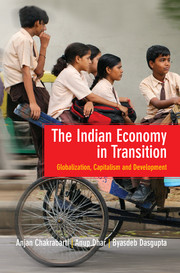Book contents
- Frontmatter
- Contents
- Preface
- Introduction
- Chapter I The Condition of the Working Class in Contemporary India
- Chapter II Capitalism: The ‘Delusive Appearance of Things’
- Chapter III Post-colonial Development and ‘The Thought of the Outside’
- Chapter IV The Word and the World of Neo-liberalism
- Chapter V The Scrypt of Transition: Between the Spectral and the Secret Thereof
- Chapter VI From Self-reliance to Neo-liberalism: The Political Economy of ‘Reform’ (1991–2014)
- Chapter VII Global Capitalism and World of the Third: The Emergent Cartography of the Indian Economy
- Chapter VIII Inclusive Development, State and Violence
- Chapter IX From Economic Crisis to Transition Crisis
- Conclusion
- Bibliography
- Author Index
- Subject Index
Chapter IV - The Word and the World of Neo-liberalism
Published online by Cambridge University Press: 18 December 2015
- Frontmatter
- Contents
- Preface
- Introduction
- Chapter I The Condition of the Working Class in Contemporary India
- Chapter II Capitalism: The ‘Delusive Appearance of Things’
- Chapter III Post-colonial Development and ‘The Thought of the Outside’
- Chapter IV The Word and the World of Neo-liberalism
- Chapter V The Scrypt of Transition: Between the Spectral and the Secret Thereof
- Chapter VI From Self-reliance to Neo-liberalism: The Political Economy of ‘Reform’ (1991–2014)
- Chapter VII Global Capitalism and World of the Third: The Emergent Cartography of the Indian Economy
- Chapter VIII Inclusive Development, State and Violence
- Chapter IX From Economic Crisis to Transition Crisis
- Conclusion
- Bibliography
- Author Index
- Subject Index
Summary
India needs less Government and more Governance
Narendra Modi, Prime Minister of India, 2014Neo-liberalism, like ‘globalization’ in the early 1990s, is a term that has come to hog much of Indian intellectual space. The term however needs a much clearer positing. Moreover, the term needs to be understood in the context of its appearance and evolution in the Indian context; all the more, because ‘India’ is the window through which we are trying to understand contemporary (global) capitalism. In further examining the relation between neo-liberalism and globalization, we will forward ‘neo-liberal globalization’ (as against other forms of globalization), as one of the important axis of India's transitional logic.
We have seen in Chapters 2 and 3 how the South is looked at through a dualistic framework (p, ∼p) with the destitute/devalued ‘third world’ represented by, first, traditional pre-capitalist agriculture (∼p) and modern capitalist industrial economy (p), and later on, additionally by informal economy (∼p) and formal capitalist economy (p). Correspondingly, development came to be understood as a transition from an overwhelmingly pre-capitalist agrarian economy to a capitalist industrialized economy. Before the advent of the current phase of globalization, the adopted developmental strategy split typically, into ‘state planning’ and the ‘market route’; some countries even combined with whatever unease both state planning and market. In the course of their evolution, two further strategies (or strategic nodal points) became a matter of choice: imported substitution industrialization strategy or ISI (adopted by countries like India, Brazil and Mexico) and the export-led industrialization strategy or ELI (adopted by countries such as South Korea, Taiwan, Hong Kong and Singapore). In India's context, state sponsored planning (within a market economy) combined with ISI gave form to the strategy of facilitating the transition towards industrial capitalism. The ‘choice’ between planning and market, and that between ISI and ELI has become irrelevant since the advent of globalization and the end of the cold war; this is what has changed; the choice between these have now become redundant. Given the reconfigured setting that took shape with the advent of the new economic policies (also known as liberalization policies), a new strategy has evolved to transit towards a modification of the capitalist economy.
- Type
- Chapter
- Information
- The Indian Economy in TransitionGlobalization, Capitalism and Development, pp. 98 - 144Publisher: Cambridge University PressPrint publication year: 2015
- 1
- Cited by

